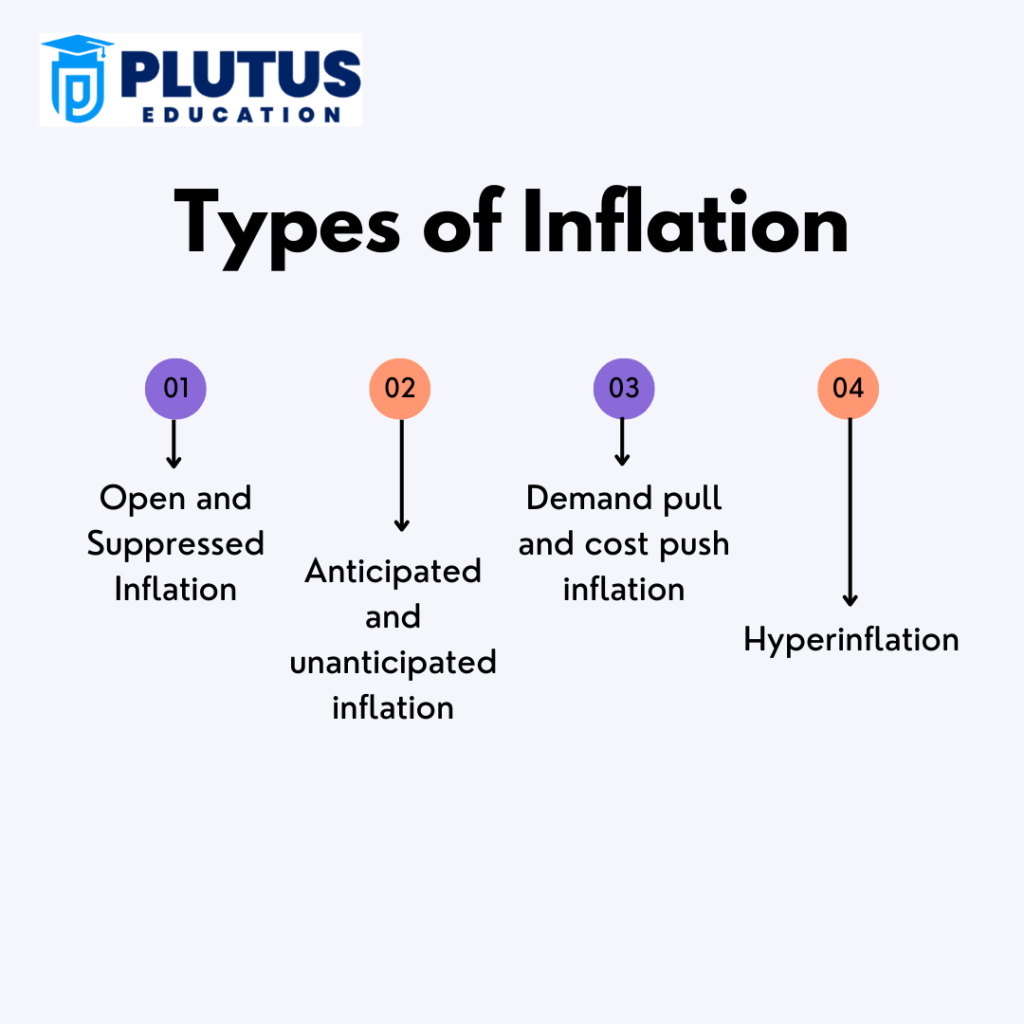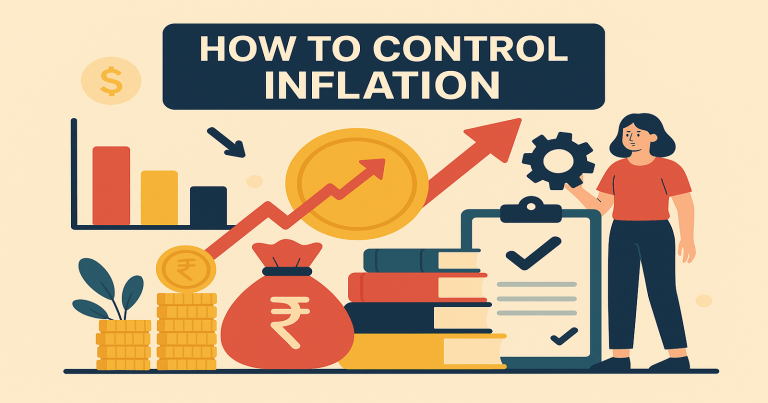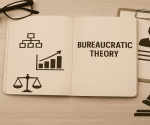Inflation means that the prices of things keep going up. When this happens, people cannot buy as many items with the same money. Food, clothes, fuel, and other needs become costlier. This affects daily life badly. The poor and middle class feel the pain the most. So, it becomes essential to learn how to control inflation. The good news is we can control inflation using the right tools and actions. The Reserve Bank of India (RBI), and governments play a significant role. They change interest rates, taxes, and spending methods to decrease inflation. India has often seen inflation due to fuel price hikes, poor rainfall, and global events. Inflation hurts savings and stops people from investing. It also causes worry in markets and business sectors. So, stopping inflation is very important for a strong economy. Inflation control helps balance prices and protects ordinary people from high costs. When we understand how inflation works, we can quickly avoid significant economic problems.
What is Inflation?
Inflation is a rise in the overall price level of goods and services over time. This means you pay more for the same things you bought earlier. When inflation happens, the value of money falls. Your ₹100 cannot buy what it used to. This affects every person, whether rich or poor. Everyone needs food, clothes, fuel, and medicines. If their prices go up, life becomes hard for all.
Inflation is expected in any economy. A small amount of inflation is good. It shows that the economy is growing. But when inflation rises fast and for a long time, it becomes a problem. It worries people, reduces their savings, and increases the cost of borrowing. That is why controlling inflation is essential.
To understand inflation better, let’s look at the two main ways to measure it:
- Consumer Price Index (CPI): CPI index shows the price of items people use every day, such as vegetables, milk, clothes, and fuel. It directly shows how inflation affects ordinary people.
- Wholesale Price Index (WPI): This shows the price of goods sold in bulk, like steel, cement, and crops, before they reach the market. It is vital for industries and businesses.

Types of Inflation
Inflation does not always occur for the same reason. It can rise because of high demand, rising costs, or other long-term factors. Each type of inflation affects prices differently. Knowing the types of inflation helps us choose the best method to control it.
1. Demand-Pull Inflation
Demand pull inflation happens when too many people want to buy goods, but not enough goods are available. For example, more people purchase sweets or clothes during festive seasons. If shops don’t have enough stock, they raise the prices.
2. Cost-Push Inflation
This takes place when it becomes expensive to make goods. This can happen when petrol, electricity, or raw material prices increase. As a result, the final product becomes more costly for customers.
3. Built-in Inflation
This happens when workers want higher pay because things are costlier. Then, companies increase their product prices to cover this new wage cost. It becomes a cycle—prices rise, then salaries rise, and again prices rise.
4. Hyperinflation
This is a hazardous type. Prices go up very fast, sometimes every day. This happened in countries like Zimbabwe. A loaf of bread costs millions of their currency, destroying the economy quickly.
Each type needs a special solution. Understanding the reason for inflation is essential before we try to fix it.
How to Control Inflation?
Inflation is like a fire—it starts small, but if you don’t act quickly, it spreads and burns everything. That is why it is essential to understand how to control inflation early. Controlling inflation means slowing down the fast rise in prices. To do this, governments and central banks use special tools. These tools help reduce too much money in the market, cut down demand, and improve the supply of goods. Inflation control also helps protect savings, jobs, and business profits. In India, the RBI and the Government are taking steps to control inflation. Let’s look at their methods in detail.
Role of the Reserve Bank of India (RBI): Monetary Tools
The RBI controls inflation using monetary policy tools. These tools reduce the money supply in the economy and make borrowing costlier. Here’s how each one works:
1. Repo Rate
This is the rate at which banks borrow money from the RBI. When the RBI raises this rate, banks must pay more interest, so banks give fewer loans to customers. People then spend less money on big things like houses, cars, or gadgets. Less spending means less demand, which helps bring down prices. This is one of the most direct and powerful ways to control inflation.
2. Reverse Repo Rate
This is the interest RBI gives banks when depositing their money with RBI. When RBI increases this rate, banks park more money with RBI instead of giving it as loans. This reduces the money flow in the economy. Less money in the market means less spending and less price rise.
3. Cash Reserve Ratio (CRR)
CRR is the percentage of money banks must keep from RBI from their total deposits. When RBI increases CRR, banks have less money to give out as loans. This cuts down extra cash in the system and reduces consumer spending.
4. Open Market Operations (OMO)
RBI also buys or sells government securities in the open market. When it sells securities, money goes back to RBI from banks and people. This reduces liquidity and helps control inflation. When money is tight, prices tend to fall or stop rising fast.
Role of the Government: Fiscal Tools
The Government uses fiscal policy tools to influence spending and demand directly. These tools either increase or decrease the amount of money in the public’s hands.
1. Cutting Public Spending
When the Government spends less on large projects like highways, buildings, or welfare schemes, there is less money going into the economy. This helps reduce inflation by lowering demand. This step is important when inflation becomes too high.
2. Raising Taxes
If people pay more taxes on income or goods, they have less money to spend. When people spend less, demand goes down. When demand falls, prices also begin to drop or rise more slowly.
3. Reducing Subsidies
The Government gives subsidies to lower the prices of food, gas, or electricity. But if everyone gets too many subsidies, demand increases. The Government can stop unnecessary demand by targeting subsidies only to low-income people and removing them for others.
4. Importing Essential Goods
The Government can allow cheap imports of food, oil, or raw material prices to rise due to low local supply. More supply in the market helps bring prices down. This is a quick way to control inflation caused by shortages.
Causes of Inflation
Prices do not rise without reason. Many small and big events come together and push costs higher. Sometimes, people spend more money than usual. Sometimes, goods are not available in enough quantity. Other times, it costs more to make or move items. When these things happen again and again, inflation starts to grow. In India, inflation often rises due to food shortages, fuel price hikes, or sudden global events. These causes are called inflation’s causes, and each affects the economy differently.
1. Too Much Demand
Prices rise when people have more money and want to buy more, but the market does not have enough goods. This is common during economic booms when people earn more and spend more. If supply stays the same but demand increases, inflation will rise.
2. Supply Shortage
If farmers grow less food due to bad rain or if factories make fewer products, there will be less supply. At the same time, if people still want to buy, they will pay more. For example, if there’s a shortage of onions, their price will increase quickly.
3. Cost Increase
If the price of petrol or diesel goes up, transportation becomes expensive. Companies spend more to move goods, raising the final product price to cover this cost. Also, if electricity or wages increase, it adds to the cost.
4. Weak Rupee
When the value of the Indian Rupee falls compared to the US Dollar, all imported items become costly. India imports oil, gadgets, and gold. A weak rupee increases the cost of these items and causes inflation.
5. Too Much Money
If RBI prints a lot of money or banks give easy loans, people have extra cash. They start buying more, which leads to demand-pull inflation. If this is not controlled, inflation keeps growing.
6. Global Events
Inflation also rises due to things happening outside India. War, pandemics, and global oil crises can disturb trade and increase the cost of goods and services everywhere.
How to Control Inflation in India?
Inflation in India often rises due to factors like food shortages, rising fuel prices, heavy imports, and weak supply chains. India’s large population and income differences also make price control more difficult. So, to know how to control inflation in India, we must look at short-term and long-term solutions. The Reserve Bank of India and the Central Government work together to keep inflation within safe levels. They use tools to manage money flow, boost supply, and reduce unnecessary spending. But to stop inflation, we also need better infrastructure, farming, and fuel policies. Let’s now understand how India can control inflation with better planning and timely action.
Short-Term Solutions to Control Inflation in India
These steps help bring down prices quickly when inflation rises suddenly.
1. Release Buffer Stock of Food Grains
The Government keeps food grains like wheat and rice in storage. When food prices rise, it can release this stock into the market. This increases supply, balances demand, and helps reduce prices. It also stops hoarding and panic buying during shortages.
2. Cut Import Duties on Essential Items
When the price of items like edible oil or pulses increases, India can reduce import taxes. This makes foreign goods cheaper in the Indian market, increases competition, improves supply, and quickly brings down the prices of basic food items.
3. Increase Interest Rates through RBI
The Reserve Bank of India can raise the repo rate to make loans costlier. When people and businesses borrow less, they also spend less. This reduces demand, and prices begin to cool down naturally.
4. Give Targeted Subsidies
Instead of giving subsidies to everyone, the Government can only help the poor and needy. This reduces overall demand while still protecting those who need support. It also allows the Government to use tax money more wisely.
5. Ban or Regulate Exports of Essentials
If the local supply is low, India can stop exporting essential food items like onions or rice. This keeps more goods inside the country and protects local prices from rising too much.
Long-Term Measures to Control Inflation in India
Short-term steps fix the problem for now. However, to prevent inflation in the future, we must improve the systems that support the economy.
1. Strengthen Agriculture and Irrigation
A primary reason for inflation in India is the rise in food prices. We need to help farmers grow more crops with better seeds, water systems, and market access to control this. More farm output means more food in the market and lower prices.
2. Improve Cold Storage and Transport
India wastes a lot of food because of insufficient storage places and transport trucks. We can stop this waste by building cold storage units and better roads. This will keep the supply high and help control food inflation.
3. Promote Renewable Energy
India depends heavily on imported oil, which makes fuel expensive and increases transport costs. By using solar and wind power more, we can reduce oil imports and keep inflation under control.
4. Encourage Local Manufacturing
Making products in India instead of importing them helps control inflation. “Make in India” plans can reduce foreign costs, create jobs, and balance prices in the long run.
5. Build Digital and Financial Infrastructure
Digital payment systems, like UPI and online banking, help the government track money flow better. This reduces black money, improves tax collection, and lets the Government manage inflation with better data.
Role of Citizens in Inflation Control
Citizens also have a role in keeping prices under control. People who act wisely can help reduce demand and avoid unnecessary inflation pressure.
- Buy only what you need: Avoid over-shopping during panic times. This stops sudden demand spikes.
- Save more when prices rise: Spend less on luxury items when inflation is high.
- Support local sellers: Buy goods made in India to reduce the need for expensive imports.
- Report hoarding and black marketing: This helps authorities quickly restore price balance.
How to Control Inflation FAQs
1. What is the best way to control inflation?
It is best to use a mix of monetary and fiscal tools. The RBI controls interest rates, while the Government controls spending.
2. How can inflation in India be controlled?
India can control inflation by raising repo rates, cutting import taxes, boosting local supply, and improving infrastructure.
3. Why does inflation happen?
Inflation happens when demand is more than supply or production costs rise.
4. Can people help control inflation?
People can spend wisely, avoid panic buying, and report black marketing.
5. What is the role of RBI in controlling inflation?
RBI raises interest rates, adjusts CRR, and buys/sells bonds to reduce or add money to the market.
6. Which government schemes help reduce inflation?
PM Garib Kalyan Yojana, Ujjwala Yojana, and MSP reforms help manage inflation impact.


